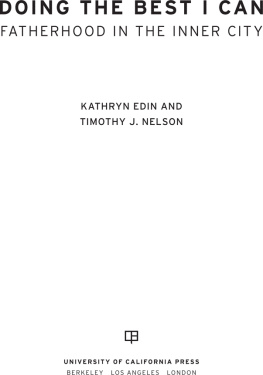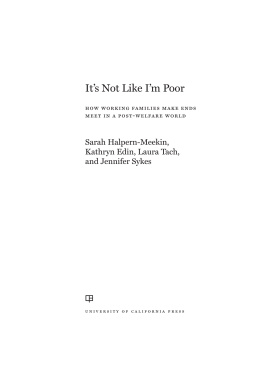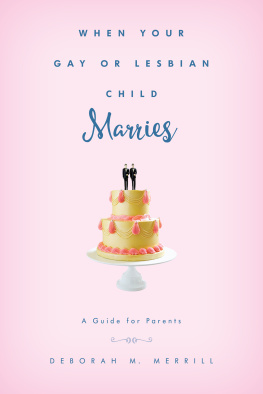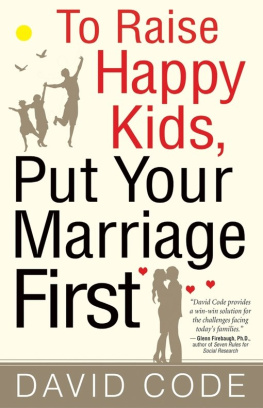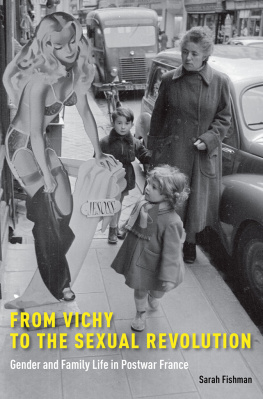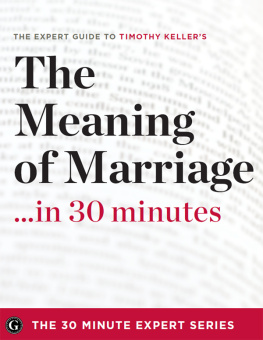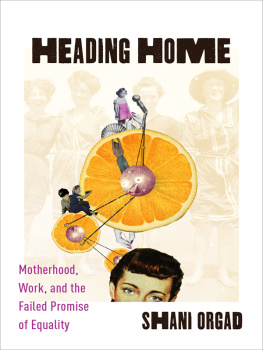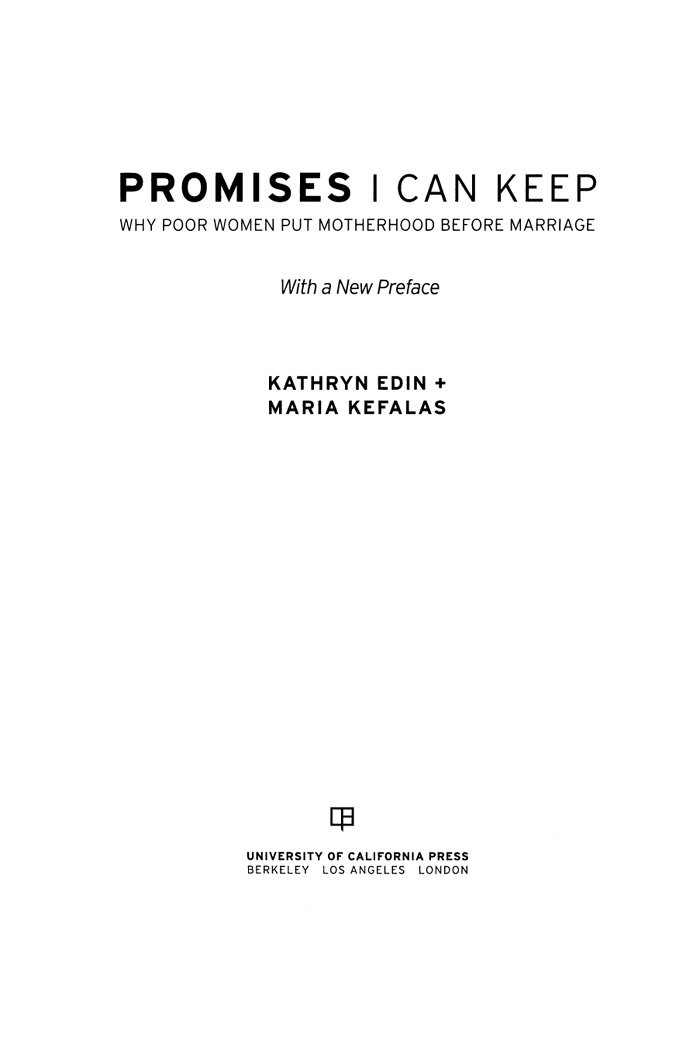PROMISES I CAN KEEP
PROMISES I CAN KEEP
WHY POOR WOMEN PUT MOTHERHOOD BEFORE MARRIAGE
With a New Preface
KATHRYN EDIN + MARIA KEFALAS

University of California Press, one of the most distinguished university presses in the United States, enriches lives around the world by advancing scholarship in the humanities, social sciences, and natural sciences. Its activities are supported by the UC Press Foundation and by philanthropic contributions from individuals and institutions. For more information, visit www.ucpress.edu.
University of California Press
Berkeley and Los Angeles, California
University of California Press, Ltd.
London, England
First paperback printing 2007
2005, 2011 by Kathryn Edin and Maria Kefalas
ISBN 978-0-520-27146-3 (pbk. : alk. paper)
The Library of Congress has cataloged an earlier edition as follows:
Library of Congress Cataloging-in-Publication Data
Edin, Kathryn
Promises I can keep : why poor women put motherhood before marriage / Kathryn Edin, Maria Kefalas.
p. cm.
Includes bibliographical references and index.
ISBN 13: 978-0-520-24819-9 (pbk. : alk.)
1. Unmarried mothersPennsylvaniaPhiladelphia.
2. Poor single mothersPennsylvaniaPhiladelphia. I. Kefalas, Maria. II. Title.
HQ759.45.E35 2005
2004022032
Manufactured in the United States of America
20 19 18 17 16 15 14 13 12 11
10 9 8 7 6 5 4 3 1
In keeping with a commitment to support environmentally responsible and sustainable printing practices, UC Press has printed this book on Rolland Envirol00, a 100% post-consumer fiber paper that is FSC certified, deinked, processed chlorine-free, and manufactured with renewable biogas energy. It is acid-free and EcoLogo certified.
CONTENTS
PREFACE TO THE 2011 EDITION
Promises I Can Keep chronicles the lives of 162 low-income women at the turn of the twenty-first century. So-called single mothers, theyve all had children outside of a marital bond. When we first met them in the late 1990s, a third of all American births were to unmarried women. Now, more than a decade later, the rate exceeds four in ten.
The story of how poor unmarried couples come together, conceive a child, and then break apart is the arc we chronicle in Promises. These residents of low-income communities across Philadelphia and its sister city, Camden, let us into their worlds so that we could better understand why poor women have children while young and unmarried, a situation which most observers would argue makes having a child a bad decision for all concerned. Rather than approaching the subject from a normative perspective, we try to answer the question of why. The logic behind our focus is this: Americans can argue until they are blue in the face that such women are making a mistake, but that wont make their children any better off. To develop policy interventions that have real potential for success, understanding why these women make the family choices they do is essential.
But so-called single motherhood hides a deeper, more complex, reality. Take Deena Vallas from chapter 5, for example. With her soulful face and deep brown eyesa South Philadelphia version of the Mona LisaDeena has fallen hard three times: first for Kevin Sr., who cheated so flagrantly while she was pregnant that the stress prompted early labor; then for Patrick, who got her pregnant but then quickly succumbed to his latent love of crack, cocaine, and pills just after their daughter Magda-lena was born; and finally for Sean, a childhood sweetheart she began seeing in secret shortly after giving birth to Patricks daughter; two years later, Cameron, Deenas third child, was born.
When we first met Deena, Kevin Jr., her oldest, was two years old and the absolute apple of Patricks eyePatrick had taken on a fatherly role with enthusiasm after the boys father abandoned him soon after he was born. By the time he was in kindergarten, Kevin was adjusting to a third father figure, Sean; Patrick was completely out of the picture. Deena was confident that this time things would work because Sean was an extreme love, the craziest love Ive ever had in my whole life. A year after Promises was published, we ran into Sean at a bus stop, and when we asked how he had been, he pantomimed wrists in handcuffs. He had just been released from prison after serving time on a cocaine possession charge and had vowed to make things right with Deena and the kids.
Deenas life hardly fits the stereotypical image of a single mother. She was in three serious relationships in eight years time. Though Deena is at the extreme, relationship churning is more the rule than the exception among unmarried mothers with children. With three kids by three different fathers, this young mother must navigate a set of family ties that are extraordinarily complex. And as her childrens fathers move on to new relationships and have subsequent children, things will get even more complicated.
At no time in our history have American parents lives been more subject to relationship instability and family complexity. This is largely because the relationships of unmarried parentseven those who live togetherare so notoriously unstable in the United States, even when compared to relationships in other rich nations, including outliers like Sweden or France. Scholars were just beginning to document the extent of these trends and their impact on childrens lives when Promises was first published.
In 2009, Andrew Cherlins Marriage-Go-Round considered the question of why Americans marry, divorce, and remarry more often than adults in other rich nations. U.S. divorce rates remain high compared to similar countries, but when contrasted with nonmarital unions, the average American marriage looks downright rock solid. Children born to married mothers face only one quarter the chance of experiencing parental breakup by age five as those born to unmarried women. Unmarried partners who break up often move to new relationships with astonishing speed. Each new partner typically brings children from previous relationships, and the new couple may go on to have children together. But these new relationships are often also unstable.
If unmarried parents unions were as stable as marriages, we wouldnt worry so much about the effects on children. Indeed, in some European countries, couples maintain decades-long partnerships without ever marrying. Perhaps at some future point, lasting relationships outside of marriage will be common in the United States too, and whether a childs parents are married wont be as important. But that is not the case today: marriage is still the way that American couples sustain long-term relationships.
When urban children born outside of marriage reach kindergarten, more than three quarters, 78 percent, will have experienced either family instabilityat least one parental relationship changeor family complexityat least one half-sibling. Only 18 percent will live in families that look pretty much like marriagesno breakups, no new partners, and no children from outside relationships to complicate matters. A very small minority, 4 percent, will live in a family that fits the stereotypical image of a single mother, spending all of their childhood years with a parent who has been stably living solo since their birth.
Consequently, children born to so-called single mothersmore often unmarried couplesmay see a series of mother and father figures entering and exiting their lives, along with half siblings, stepsiblings, and other kin. And when young adults move in and out of romantic relationships while simultaneously having children, the result is family ties that are more complicated than most children have ever had to deal with, either in the United States or in other wealthy nations.


